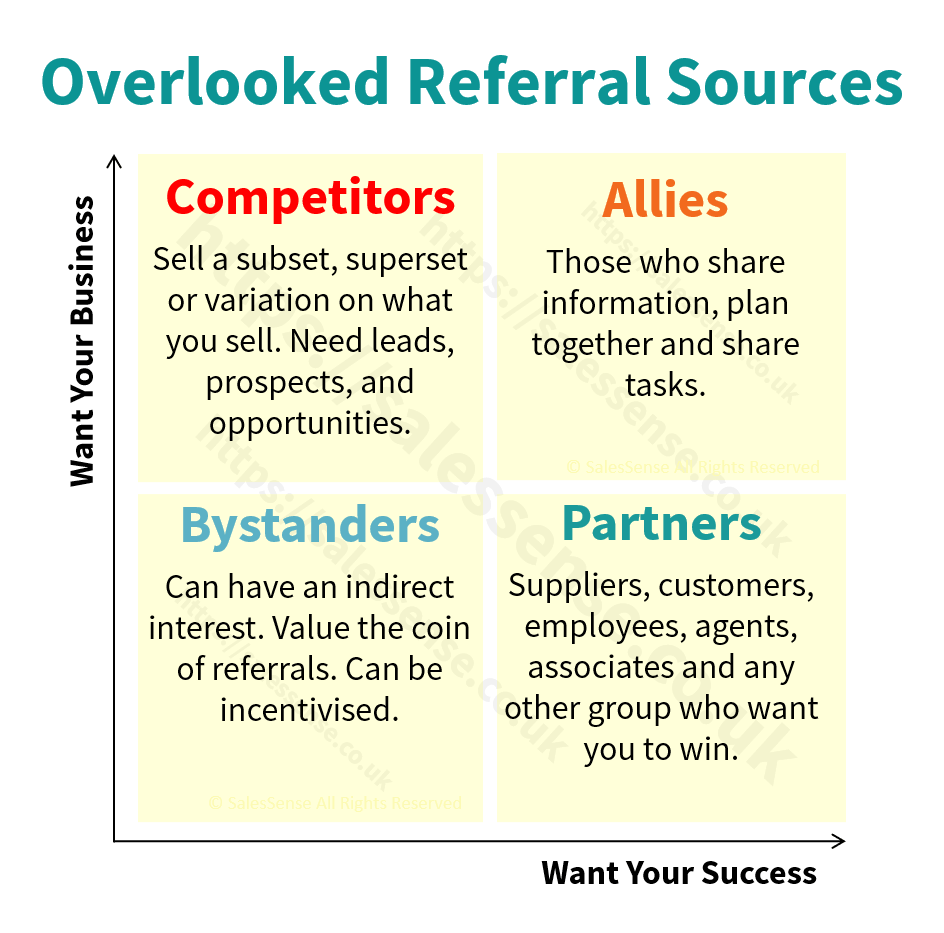Base referral incentives on how much a referral is worth.

First, work out how much a referral is worth to you or your organisation so that you can set attractive referral incentives.
To do this, measure or estimate your typical referral conversion rate. In my business, more than 8 out of 10 referrals become customers.
What is your gross profit on an average sale?
Multiply your average profit by your estimated referral conversion rate for the value of a referral.
If you have an eye on the long term, consider the average lifetime worth of a customer. Most businesses rely on repeat business, so usually the lifetime value of a customer is considerably higher than the value of a single sale.
Now you can decide what referral incentives make sense for each possible referral source:
- Content Referrals
- Referral Marketing
- Referral Forms
- Employees
- Suppliers
- Agents and Affiliates
- Business Partners
- Established Customers
- People You Don't Know
- Recommendations
- New Customers
- Those who don't buy
- Competitors
- LinkedIn Acquaintances
- Friends
- People You Have Referred
- Negotiated Referrals
Then start asking, "Would you be willing to help us deliver these results for others in exchange for . . .?"
If you base the incentive on the lifetime worth of a customer, it could be very attractive.
Expand your thinking about the types of incentives beyond naked money. In each case, what does the person or business most want?
Some ideas:
- Reduced prices or even free products or services.
- Introductions or referrals to your suppliers, business partners, and in some cases, customers.
- For employees - points towards prizes.
- Give suppliers and business partners testimonials.
- Grant privileged status.
- Offer joint marketing funds.
- Invitations to prestigious events.
- Dinners with important people.
- Favours.
- Donations.
- Sponsorship.
How many new customers could one prominent advocate deliver?
You must have some potential customers who are half-sold, yet they can't get enough internal support or budget. Turn them into advocates - customers who will speak up for your solution, be a reference, and introduce you to potential customers.
Can you incentivise business partners and suppliers to become stronger advocates or ambassadors for what you sell?
Create appropriate win/win incentives across the range of referral sources and methods listed above.
Keep In Mind:
Making referral incentives effective involves planning, clear communication, and thoughtful design. Here are some best practices:
Offer Attractive Incentives: Ensure the referral incentives are valuable and relevant to the referrer and the referred businesses. Discuss the intended incentives with the referral partners before formalising a programme. Think through the likely impact of any incentive and be prepared to create indirect value.
Simple and Clear Program Structure: The referral process should be easy to understand and participate in. Clearly outline the steps, eligibility, and rewards. Avoid overly complex rules that might deter participation.
Leverage Social Proof: Encourage referrers to share their positive experiences and reviews publicly. This builds trust and increases the likelihood of successful referrals.
Target the Right Audience: Focus on people who have reason to want you to succeed and those who are engaged with your brand. They are more likely to refer others and do so effectively.
Personalise the Approach: Tailor your messages and incentives to the different segments of your network. Personalisation makes requests feel more genuine and appealing.
Make it Easy to Share: Provide easy-to-use sharing tools, such as referral links, social media buttons, and email templates. The simpler it is for someone to refer a contact, the more likely they are to do it.
Track and Reward Promptly: Implement a robust tracking system to monitor referrals and ensure that rewards are distributed promptly. This maintains trust and encourages ongoing participation.
Communicate Effectively: Regularly remind contacts about the referral program through multiple channels (email, social media, in-app notifications). Clear and consistent communication helps keep the program top-of-mind.
Celebrate Referrals Publicly: Acknowledge and thank your top referrers publicly (with their permission). This recognition can motivate others to participate and create a sense of community.
Iterate and Improve: Gather feedback continuously to analyse the performance of referral programs. Use this data to make necessary adjustments and improve the programme's effectiveness over time.
By integrating these practices, businesses can enhance the effectiveness of their referral incentives, leading to increased customer acquisition and retention.
This is the thhird of 17 referral prospecting methods shared on this site. See the others here.
If you want to get competitor referrals or introductions from other sources, we can help. Call +44 (0)1392 851500. Alternatively, use the contact form here or send an email to jimm@salessense.co.uk.












